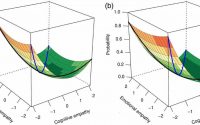Now MS pills are used to ease the agony of ulcerative colitis
Now MS pills are used to ease the agony of ulcerative colitis which affects affects about 146,000 Britons
- Albert Williamson-Taylor, 63, has suffered ulcerative colitis for the past 30 years
- All previous treatments have failed or had limited impact on his painful condition
- Experts say the drug, ozanimod, does not cause side effects like earlier pills
A drug given to multiple sclerosis patients could be used to ease the pain of severe bowel disease.
In a trial, patients with ulcerative colitis, which causes damage inside the gut, were given the pills and within a year a third were free from symptoms such as bloating, diarrhoea and pain.
Most had failed to respond to standard medications before being given the experimental treatment.
It is hoped that health watchdog the National Institute for Health and Care Excellence (Nice) will approve the drug in the coming weeks for some 10,000 patients with the most severe symptoms.

One patient to benefit from ozanimod is Albert Williamson-Taylor, a 63-year-old engineer from London. The father-of-four has suffered ulcerative colitis for 30 years, and all the treatments he tried had limited benefits

In a trial, patients with ulcerative colitis, which causes damage inside the gut, were given the pills and within a year a third were free from symptoms such as bloating, diarrhoea and pain
Experts say the drug, called ozanimod, does not cause side effects, such as blood clots, seen with other colitis tablets. Sami Hoque, consultant gastroenterologist at Barts Health NHS Trust and the trial’s chief investigator, said: ‘I have patients who have been on the tablets for three or four years and have practically no symptoms.’
Ulcerative colitis affects about 146,000 Britons and, along with Crohn’s, is one of two major types of inflammatory bowel disease.
In both conditions, the immune system goes into overdrive, attacking healthy tissue in the gut.
Inflammatory bowel disease can crop up at any age, although it usually develops in young adulthood.
Studies have shown that those of Ashkenazi Jewish heritage are more likely to suffer. While Crohn’s causes inflammation and ulcers throughout the digestive system, ulcerative colitis affects only the colon, or large bowel.
In the majority of cases, patients first visit their GP with bloating, diarrhoea, weight loss or blood in their stools.
If doctors suspect colitis, they take a stool sample to test for a protein called calprotectin, which indicates inflammation in the gut.
Further internal scans are then performed to look for physical signs of damage.
Patients are given anti-inflammatory tablets or suppositories called aminosalicylates, which help the tissue to repair itself, reducing pain and swelling. But these usually become less effective over time.
Other options include powerful steroids that lower inflammation by suppressing the immune system. However, side effects include acne, mood swings and increased vulnerability to infections.
Patients have started to have access to drugs known as biologics, delivered via an intravenous drip in hospital. These block fighter proteins called cytokines, which are sent out by the immune system and cause damage to the gut lining. But only a third of patients will respond to these, and, again, the medicine tends to lose effectiveness over time.
In the past year or so, Nice has approved another type of drug, called JAK inhibitors, for colitis. These pills, normally used to fight arthritis, change the way immune cells in the gut work, stopping them attacking healthy bowel tissue. The compound vanishes from the system in 24 hours, meaning it does not suppress the immune system.
But the drugs are known to increase the risk of blood clots, meaning they are not used for those with high blood pressure and clotting disorders.
In clinical trials, ozanimod has proved just as effective as JAK inhibitors in patients who have not responded to previous treatments. It works by binding to immune cells called lymphocytes, stopping them from going haywire and attacking the bowel.
In MS, lymphocytes attack the brain and spinal cord – which ozanimod prevents.
‘Early trials have shown that about two-thirds of ulcerative colitis patients see a significant reduction in their symptoms with ozanimod, compared to around half on biologics,’ says Dr Hoque.
The treatment is not risk-free: there is a small chance it can slow the heart rate, so the drug is not recommended for patients with abnormal heart rhythms.
One patient to benefit from ozanimod is Albert Williamson-Taylor, a 63-year-old engineer from London. The father-of-four has suffered ulcerative colitis for 30 years, and all the treatments he tried had limited benefits.
In 2016, Albert was enrolled in a trial of ozanimod at Barts and he says: ‘Almost as soon as I started taking ozanimod, the stomach pain disappeared.
‘It’s such a relief to finally find something that works.’
Source: Read Full Article


